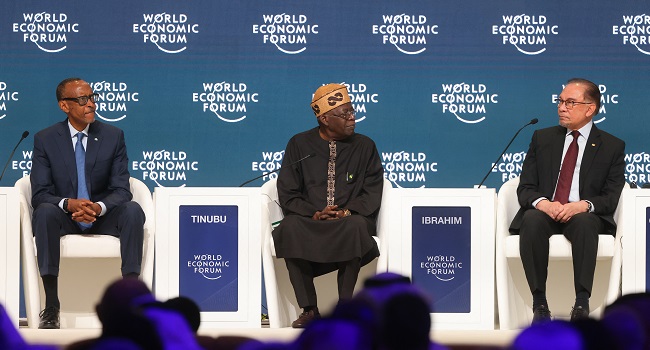
Fuel Subsidy Removal Necessary For Nigeria Not To Go Bankrupt – Tinubu
President Bola Tinubu has insisted that his administration’s decision to remove the petrol subsidy was very necessary to prevent the country from going bankrupt.
Tinubu announced the removal of subsidy on petrol the day he was inaugurated into office with the popular “subsidy is gone” speech.
The action, however, caused prices of commodities to rise through the roof, increasing hardship in the country which has made some of his critics condemn the subsidy removal as a policy not well thought out.
But speaking as one of the panelists at the ongoing World Economic Forum in Riyadh, Saudi Arabia on Sunday morning, Tinubu justified the petrol subsidy removal, maintaining that it was needed to reset the economy.
"For Nigeria, we strongly subscribe to the idea that inclusion and economic cooperation are essential to bringing stability to the rest of the world.
"With regard to the issue of the removal of subsidies, there is no doubt that it was an essential step to keep my country from going bankrupt, to restart the economy, and to pave the way for growth," Tinubu stated.
The Nigerian leader acknowledged the challenges in abandoning the programme that has for years allowed Nigerians to buy petrol at lower prices, but he insisted that he was doing what was best for the country's citizens.
It will be challenging, but making tough choices when they need to be made decisively is a sign of a strong leader. That was essential for the nation. Yes, there will be fallout and a higher number of people are expected to experience the difficulties, but once the government prioritises their interests, I think it becomes easier to handle and explain the challenges.
In the meantime, a backup plan has been put in place to mitigate the impact of the country's vulnerable population being cut off from subsidies. We cannot help but integrate the weak and those who are in agony with us all.
Fortunately, we have a young, active population that is eager to learn on its own and is prepared for technology and a strong commitment to progress. We are able to control it and divide the financial loss and consequences of eliminating subsidies.
According to Tinubu, the nation's responsibility, transparency, and physical discipline were all enhanced by the elimination of petrol subsidies. He feels that it is more crucial to concentrate on the course that the nation should take.
Equally important is currency management.
After Tinubu removed petrol subsidies, he swiftly moved on to another crucial policy: unifying the currency rate, which the president vigorously supported during the WEF panel discussion in Riyadh.
According to him, the government's control over the country's currency is also essential to the Naira's ability to compete competitively with other international currencies.
It was also vital to remove the artificial components of value from our money through currency management. Allow our local currency to level up, become competitive with other global currencies, and do away with opaqueness, corruption, and arbitrage.
That we carried out concurrently. It's a two-engine problem in a very typical government scenario, but we can handle the turbulence because we are ready for inclusive governance and quick public outreach to truly understand what's required and what has to be done.
The themes of the World Economic Forum gathering are energy for development, growth, and global collaboration.





